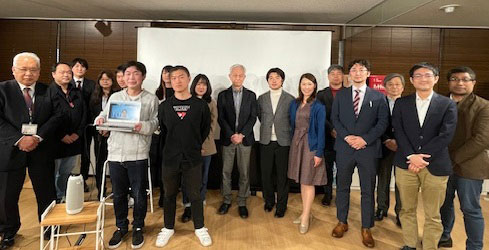News & Topics
Debrief Meeting for the Researcher New-mode Mobility Accelerator Program
Hearing fresh opinions from students and researchers who experienced overseas research activities
Strategic International Collaborative Research Program
The Researcher New-mode Mobility Accelerator Program (ReNewMap), conducted under the Strategic International Collaborative Research Program (SICORP), supports youngsters pursuing research in other countries and promotes their first step toward international research activities, such as studying abroad in the long term, acquiring posts, and implementing international collaborative research programs, to foster global research talents who can contribute to the development of science and technology.
In July 2022, JST solicited applications for bilateral joint research projects with target countries (the USA, the UK, Germany, Italy, Australia, France, Canada, Spain, Netherlands, Switzerland, and Sweden) where young researchers can travel and collaborate research activities in advanced fields related to digital science, artificial intelligence, and quantum technology. We adopted the funding of nine projects for collaborative research and travel expenses; the support period is approximately one year from February 2023.
Details of the program:
https://www.jst.go.jp/inter/english/program_e/sicorp_e/renewmap.html
In conjunction with the termination of the research period at the end of March 2024, a debrief meeting was held at JST Tokyo Headquarters (Science Plaza) on March 25.
Under ReNewMap, principal investigators who conduct international collaborative research serve as mentors, and the students and young researchers who receive mentorship conduct research activities in the partner countries.
In the first half of the meeting, nine students and young researchers who studied overseas under the program made presentations and held Q&A sessions. They exchanged opinions with Dr. Kenjiro Miyano, Program Officer, and other researchers. In the second half of the meetings, the themes picked up from the memos submitted by them , such as their stories of hardships related to research and travel and their perspectives on the future, were discussed in detail in a round-table discussion format.
Overall, conducting research activities in partner countries with sufficient support over a period of time not only advanced the research but also yielded the outcomes the program had aimed for. For example, the students noted statements such as “I could have research colleagues in other countries,” “I invited famous researchers to Japan,” “I published a co-authored paper,” “I became a gateway as a community member at an overseas research institution,” “I have been motivated to continue my research,” and “I gained an opportunity for personal growth through this experience.”
However, there also appeared to be some difficulties in various situations, such as finding a place to live, obtaining visas, and handling intellectual property. In addition, the students talked about the differences in their host country compared to Japan, including the low threshold between laboratories and the abundance of open spaces, which increased opportunities to meet people from different fields and made it easier to generate innovative ideas.
Although the support was small in scale, a mentor commented that it was appropriate for students and young researchers preparing to start international collaborative research.
We are planning to post the memos and completion reports by the participants of the program on the SICORP website after the summer of 2024.

Group photo after the meeting (An online participant from the United States joined over the PC screen)
